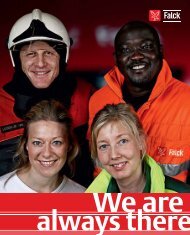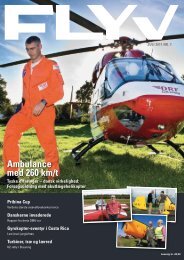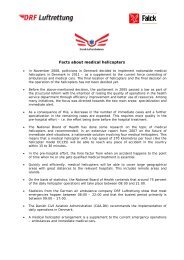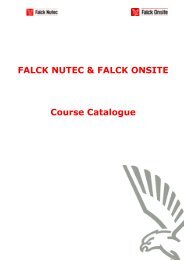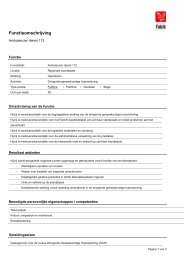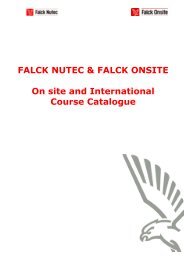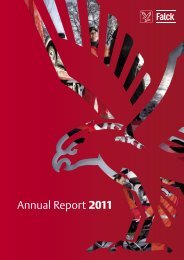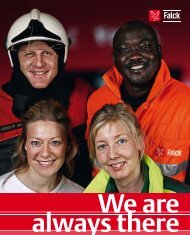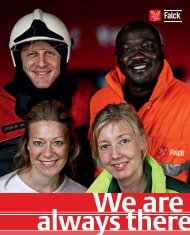Annual Report 2010 - Falck
Annual Report 2010 - Falck
Annual Report 2010 - Falck
You also want an ePaper? Increase the reach of your titles
YUMPU automatically turns print PDFs into web optimized ePapers that Google loves.
48 <strong>Falck</strong> <strong>Annual</strong> <strong>Report</strong> <strong>2010</strong> | Management review<br />
<strong>Falck</strong> generally endeavours to minimise its consumption of resources<br />
and the discharge of pollutants from the sources listed<br />
above. In the pursuit of its activities, <strong>Falck</strong> pays attention to<br />
reducing the negative environmental impact and continuously<br />
logs its consumption. Registration of environmental data ensures<br />
that performance in the area can constantly be monitored<br />
and optimised.<br />
An example of <strong>Falck</strong>’s environmental initiatives is the introduction<br />
with effect from 2011 of electronic pay slips which replace<br />
almost 10,000 pay slips per month.<br />
<strong>Falck</strong> has also installed a monitoring system in 30 vehicles<br />
in Denmark. The system monitors rapid acceleration, hard<br />
breaking, sharp turning and idle running of engines, all of which<br />
affect fuel consumption and wearing parts. This is expected to<br />
lead to changes in driving behaviour that will save 5-20% of fuel<br />
costs.<br />
Employee relations<br />
The <strong>Falck</strong> Group respects the freedom of association of its<br />
employees and other workers with respect to legal labour<br />
unions and recognises the employees’ right to collective<br />
bargaining. The <strong>Falck</strong> Group ensures a safe and healthy working<br />
environment which protects against accidents and injury.<br />
The work on safety and prevention of injury at work is carried<br />
out in collaboration with the operational and safety organisations<br />
in the individual countries of operation. They develop and<br />
hold courses in transfer techniques, lifting/carrying techniques,<br />
information material, and material for use in activities relating<br />
to the psychological working environment. Likewise, the safety<br />
organisation intends to ensure that <strong>Falck</strong> has the right safety<br />
equipment for its employees, such as patient lifts, lifting cushions<br />
for patients lying on the ground, electric stair climbers for<br />
the airport, etc.<br />
In 2001, <strong>Falck</strong> introduced a new health service for its employees<br />
in Denmark by way of “Interdisciplinary Treatment” with a view<br />
to treating and preventing work-related injuries which reduce<br />
both employee well-being and productivity and should there-<br />
fore be efficiently prevented. Outside the areas where <strong>Falck</strong> has<br />
concepts of its own to handle such injuries, external suppliers<br />
or in-house specialists are used. Later on, this health service was<br />
expanded to include health consulting, including assistance to<br />
understand and use the healthcare system.<br />
At injury or accident sites, rescue officers and fire fighters<br />
experience events that can be very intense and potentially<br />
impair their quality of life and working capacity. As in the case<br />
of physical injury, there are defined guidelines on how to act,<br />
if such problems arise. Since 1993, <strong>Falck</strong> has ensured that<br />
its employees can get crisis therapy, which includes internal<br />
debriefing as well as assistance from psychologists and other<br />
trauma experts. Based on this experience, both crisis therapy<br />
and interdisciplinary treatment are now important elements<br />
of the services <strong>Falck</strong> offers its customers, and the pursuit of<br />
corporate social responsibility has thus given <strong>Falck</strong> opportunities<br />
for product innovation for the benefit of both Danish and<br />
international companies.<br />
In spite of the many preventive and curative initiatives, <strong>Falck</strong><br />
staff, especially ambulance staff, do on occasion suffer physical<br />
injuries which prevent them from continuing in their job. The<br />
psychological consequences of the job may also make it necessary<br />
for an employee to stop his or her career as an ambulance<br />
officer. There is great focus on either finding a different job<br />
in-house for such employees or on establishing special jobs that<br />
match what the employee can handle in his or her new situation.<br />
In <strong>2010</strong>, the largest project to date within health and safety<br />
at work was initiated aimed at minimising the number of back<br />
injuries among rescue staff. The project runs over 20 months in<br />
a partnership with the Danish Technological Institute and the<br />
Danish Prevention Fund. The project involves about 375 rescue<br />
officers from all regions of Denmark.<br />
The <strong>Falck</strong> Group’s code of conduct naturally requires that<br />
human rights are observed, including that child labour or forced<br />
labour does not occur. Moreover, rules have been defined in<br />
order to avoid discrimination relating to working and employment<br />
conditions.



